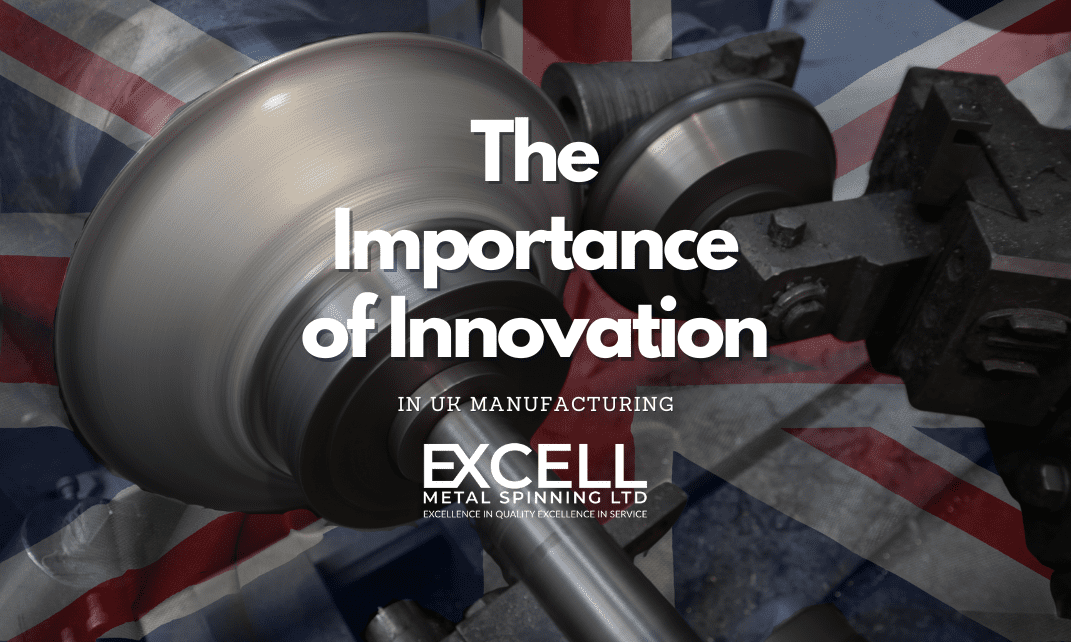The Importance of Innovation in UK Manufacturing

Curtis Bligh
UK Manufacturing plays a pivotal role within the economy, shaping society and innovating like no other. It is the most productive sector within the UK economy and outstrips productivity growth of the most flaunted services sector. A colossal 70% of business R&D, and 13% of all business investment is within UK manufacturing, making it one of the most dynamic sectors in the UK.
The sector makes up over 43% of all UK exports and employs over 2.6 million people. It is clear then, how important this industry is for economic growth in the UK. And with the rise of artificial intelligence and robotics, we are witnessing significant changes taking place.
Manufacturers are innovating more than any other business sector. We are seeing products made faster and more efficiently, making industry more responsive to changing global markets. With the adoption of new technologies, manufacturers continue to face many challenges. The opportunities however, are ever present.
Let’s explore this in more detail.
The Role of Innovation and Technology in UK Manufacturing
Innovation is playing a pivotal role within UK manufacturing, working in tandem with the rapid advancement of new technologies. The development of new products and services is enabling manufacturers to meet the changing needs of customers and markets, while streamlining production processes and reducing costs. By embracing innovation, businesses are staying ahead of the curve and effectively competing in the ever-evolving market.
Automation, for example, has been revolutionary for the UK manufacturing industry, unlocking the potential to produce products with greater efficiency and accuracy. With the advent of new technology, repetitive operations can now be fully automated with minimal errors. Partnered with data analytics, manufacturers are now able to collect and analyse data from various sources. Sensors are one such example being used within the production line to optimise processes, improve quality control and subsequently reduce costs.
In recent years, we have seen a growing rise of robotics integrated within the production lines of UK manufacturers. And with the growth of The Internet of Things (IoT), manufacturers are implementing further improvements in downtime reduction and quality enhancements. According to a report from the Department for Business, Energy & Industrial Strategy, robotics and autonomous systems have the potential to raise UK Manufacturing GVA by 21% in less than a decade.
Let’s explore more on how UK manufacturing is innovating;
The Internet of Things (IoT) in UK manufacturing
In its most basic form, IoT connects devices through the internet to collect and share data. It is with this, that UK Manufacturing is transforming. In fact, the number of IoT devices in the UK is projected to grow to over 150 million this year. That’s a growth of 137 million since 2006!
Data from Statista indicates that around half of the industrial manufacturers surveyed, were already utilising IoT related solutions in logistics in 2019. Meanwhile, a government report has highlighted that 40% of all IoT connections stem from the white goods and consumer wearable markets. However, projections show that future growth will be within the automotive, consumer electronics and utilities sectors.
Statista indicates that industrial IoT is expected to dominate among the various sectors with a projected market volume of £8.3 billion. And as part of its industrial strategy challenge fund, HM Government has allocated £20 million to support IoT developments in UK manufacturing. With several initiatives in place, government has recognised the growing importance IoT has on streamlining operations and achieving greater productivity.
Artificial Intelligence in UK manufacturing
The growing rise of artificial intelligence has been significant in recent years. And UK manufacturers are now beginning to utilise this to enhance quality control and efficiency throughout their supply chains.
The role of AI, as a simulation of human intelligence in machines, means systems can perform tasks that usually require a human. This includes the ability to learn from data, problem solve and even decision making. AI has been particularly effective for predictive maintenance, robotics, quality control and automation.
Surveys from McKinsey highlight that 70% of manufacturers are currently using or plan to use AI for process optimisation. A big indicator that many manufacturers see value in the use of AI in this area. Further reports suggest that AI is geared towards quality control and supply chain optimisation in manufacturing. 39% of manufacturers surveyed, use AI for their quality inspection.
A great example is PepsiCo, who have deployed AI-powered sensors across its factories in the UK. These sensors are being used to detect faults such as the wearing of their conveyor belts and bearings. AI monitors this, and all the while analyses machinery vibrations. With an abundance of audio data due to the huge volumes being produced, an early warning system has been created. PepsiCo are now able to effectively schedule maintenance in advance, subsequently avoiding the need to react to errors when they occur.
AI is making waves in industry for its usefulness in improving efficiency and reducing waste. In addition to product quality improvements, manufacturers are taking advantage of cost savings and increased competitive in the global markets!
Robotics in UK Manufacturing
UK manufacturers continue to innovate, and robotics has played an important role within industry. Latest figures from the International Federation of Robotics (IFR) see record numbers of robotics within UK factories. In 2020, there was a 5% growth, amounting to 21,700 industrial robots in operation in the UK. 52% of these stemmed from the UK’s automotive industry, whilst 13% came from the plastics and chemicals sector.
However, last year proved particularly challenging. Due to a flatlining of productivity, a shortfall of industrial bots meant we fell short of our international peers. The Telegraph indicated that we were behind on robotic density, with only 111 per 10,000 manufacturing workers.
Despite this, robotics are helping UK manufacturers increase efficiency and improve safety. Tasks such as heavy lifting, welding and painting can now be handled without a human operator. With these machines able to work around the clock, businesses are able to increase productivity and reduce costs.
In fact, the application of robotics could be worth £184bn to the UK economy over the next decade according to reports by Made Smarter. Challenges are still present nevertheless, especially with cost of implementation and finding skilled labour to operate and maintain.
The Opportunities and Challenges in adopting emerging technologies for UK manufacturers
UK manufacturing has been presented with a number of opportunities with the implementation of emerging technologies. Reports from the UK government indicate manufacturers will be capable of rapidly adapting their physical and intellectual infrastructures. This means businesses within industry can exploit changes in technology as production becomes faster, and more responsive to changes in the market.
A wider range of skills can also be harnessed by early adopters, especially in STEM subjects. All aspects of manufacturing will be pervaded by constant adaptability. This can range from research and development, production processes and lifetime product maintenance and repair. And with new technology, the opportunity to drive sustainability is ever present. UK manufacturers are now able to adapt their processes with built-in reuse, remanufacturing and recycling for products reaching their end of life cycle.
With these developments in place, further emphasis is being made on the key role of physical production. Especially in unlocking innovative new revenue streams and the use of ‘Big data’ to increase competitiveness.
The adoption of new technologies isn’t without its challenges however. The biggest issue UK manufacturers are faced with is the shortage of skilled workers. Make UK, reported that UK manufacturing faces a significant skills gap. 81% of manufacturers are experiencing recruitment difficulties, whilst 25% of vacancies are difficult to fill. Low-skilled job roles are also at risk as a result of emerging technologies. The government suggests that workforces will need to be highly skilled and adaptable, piling onto the strain of a skills shortage. The UK government are trying to address the skills gaps with several initiatives, including the establishment of the national skills academy for manufacturing. However, the effectiveness of this remains to be seen.
On the other hand, emerging technologies are providing opportunities for further growth and innovation. The Office of National Statistics indicated that manufacturing contributed £191 billion to the UK economy in 2022. And with a higher productivity rate than the services sector, the adoption of new technologies is expected to further enhance it further.
Conclusion
UK manufacturing remains a vital components of the UK economy, contributing over 43% of all UK exports and employing over 2.6 million people. And with the advent of new technology, industry is undergoing rapid changes, enhancing quality control, efficiency and sustainability. The opportunities are ever present, but so are the challenges.
In order for UK manufacturers to really unlock the full potential of emerging technologies, industry must overcome the hurdles of the skills shortage. The effectiveness of several Government initiatives is yet to be seen, and many are calling for a Minister of Manufacturing role to be introduced. Some business have adopted new initiatives to address the skills shortage. Excell Metal Spinning Ltd. for example, work closely with their local colleges and universities. In fact, they are board members for T-Level Engineering for their local college, helping align curriculum to address real, industry challenges. By taking a proactive approach, businesses in manufacturing can address the skills required to operate and maintain new technologies as they emerge.
Request a Quote
Related Articles

Boosting British Manufacturing: A £360 Million Investment
Boosting British Manufacturing: A £360 Million Investment Facebook Twitter LinkedIn WhatsApp Email It’s been declared ahead of the Budget that Chancellor Jeremy Hunt will announce

Design Considerations for Metal Spinning Success: Part One
There are many design considerations businesses should considers to get the most out of their metal spinning supply. Read Part One here

Strategy in Place to Boost UK Supply Chain Resilience
The UK Government has recently launched a new initiative to boost UK supply chain resilience. The Critical Imports and Supply Chain Strategy

